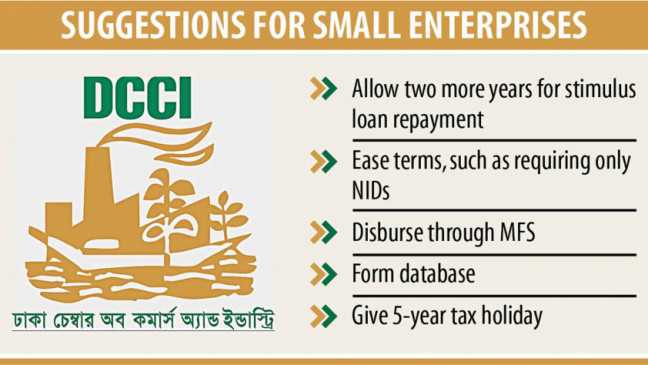Ease stimulus conditions for SMEs

The repayment period for loans from the stimulus package aimed at cottage, micro, small and medium enterprises (CMSMEs) should be extended by two years as those firms have already been severely impacted by the pandemic, according to speakers at a virtual debate.
In its spending plan proposal for fiscal 2021-22, the Dhaka Chamber of Commerce and Industry (DCCI) yesterday demanded that the federal government ease the conditions for the CMSMEs to avail stimulus funds.
The leading business chamber continued to recommend forming a national data source of the CMSMEs in the united states to make sure transparency in disbursements.
Since companies in the sector deal with numerous difficulties when availing loans from the stimulus bundle, the DCCI as well urged for the CMSMEs to get financing with national identity cards getting the only required file.
Economists, bankers, businesspeople and senior government officials in the debate, organised by the DCCI, echoed the same.
"The government should think about mobile financial offerings (MFS) as a platform for disbursing loans for the CMSMEs as banks fear the risks," said Hossain Zillur Rahman, an economist and former adviser to a caretaker government. Besides, there is certainly uncertainty over the country's economic recovery amid the recent upsurge of Covid-19 infections, he added.
Naser Ezaz Bijoy, chief executive officer of Normal Chartered Bangladesh, suggested easing the conditions and expanding usage of credit promise schemes for the CMSMEs.
"We need to think about how to protect our very small and small business owners," explained Md Fazlul Hoque, ex - president of the Bangladesh Knitwear Manufacturers and Exporters Association.
Hoque also asked the government to enable import of most chemicals and equipment necessary for effluent treatment vegetation (ETPs) duty-free found in the upcoming national spending budget.
"This would help factory owners look encouraged to determine ETPs and thereby preserve the environment," he added.
Md Jasim Uddin, chairman of Bengal Commercial Lender, suggested the introduction of a self-assessment center and five-12 months tax holiday for the CMSMEs.
Up to now, around 68 %, or Tk 13,600 crore of the Tk 23,000 crore allocated for the CMSMEs, has been disbursed.
The rate of disbursement in the sector has been slow in comparison to other stimulus packages, said Masudur Rahman, chairman of SME Foundation.
"About 98 % of the fund for the export-oriented sectors was already disbursed," he said, adding that workers employed by the CMSMEs possess witnessed a 10 per cent reduction in wages in the last year.
The SME Foundation chairman also suggested reducing the taxes for light engineering sector, garment accessories and packaging, and motor vehicle spare parts making as these industries were growing.
In response to these demands and suggestions, Syed Golam Kibria, an associate of the National Board of Revenue, explained they would consider different tax facilities for the CMSME, agricultural, and livestock sectors in the next budget.
"Next year's aim for for generating revenue from customs duty will be Tk 100,000 crore," Kibria added.
M Tamim, another former adviser to a caretaker government, said the recurrent hikes in energy prices create uncertainty among businesspeople.
Bangladesh will have to depend on major sources of energy for at least the next twenty years as alternative options are yet to come to be readily available in the united states, he added.
Moshiur Rahman, the primary minister's adviser on economical affairs, said the tax net ought to be widened to improve the tax-GDP ratio.
Mustafiz Shafi, editor of The Daily Samakal, demanded the import duty on newspaper products to come to be reduced to zero per cent from the existing 5 per cent.
He also asked for a reduction in corporate tax, which currently stands at 32.5 %.
In the same way, the DCCI demanded that corporate tax be brought down to a rational level.
The global average of corporate tax is 23.8 % although it is 21.13 % found in Asian nations, the DCCI said found in its budget proposal, which was previously submitted to the National Board of Revenue.
The chamber also demanded a gradual reduction of income tax for listed and non-listed companies.
For instance, the chamber asked for tax to be reduced to 30 % from 32.5 % in the cover 2021-22, 27.5 % in fiscal 2022-23, and 25 per cent in fiscal 2023-24.
The DCCI also demanded that VAT registration be produced mandatory only for firms with turnovers of over Tk 4 crore.
The debate was moderated by DCCI President Rizwan Rahman.
Previous Story
- Exploring the scope of SME bond
- Graduates struggling to secure employment
- Multiple regulators resulting in increased tariffs in energy...
- Setup specialised bank for little enterprises: DCCI
- More SME research to diversify exports: commerce minister
- ETBL Securities MD Rizwan elected DCCI president
- Investment Summit to attract Dutch investors in key...
- Simplify of VAT system for better SME business...